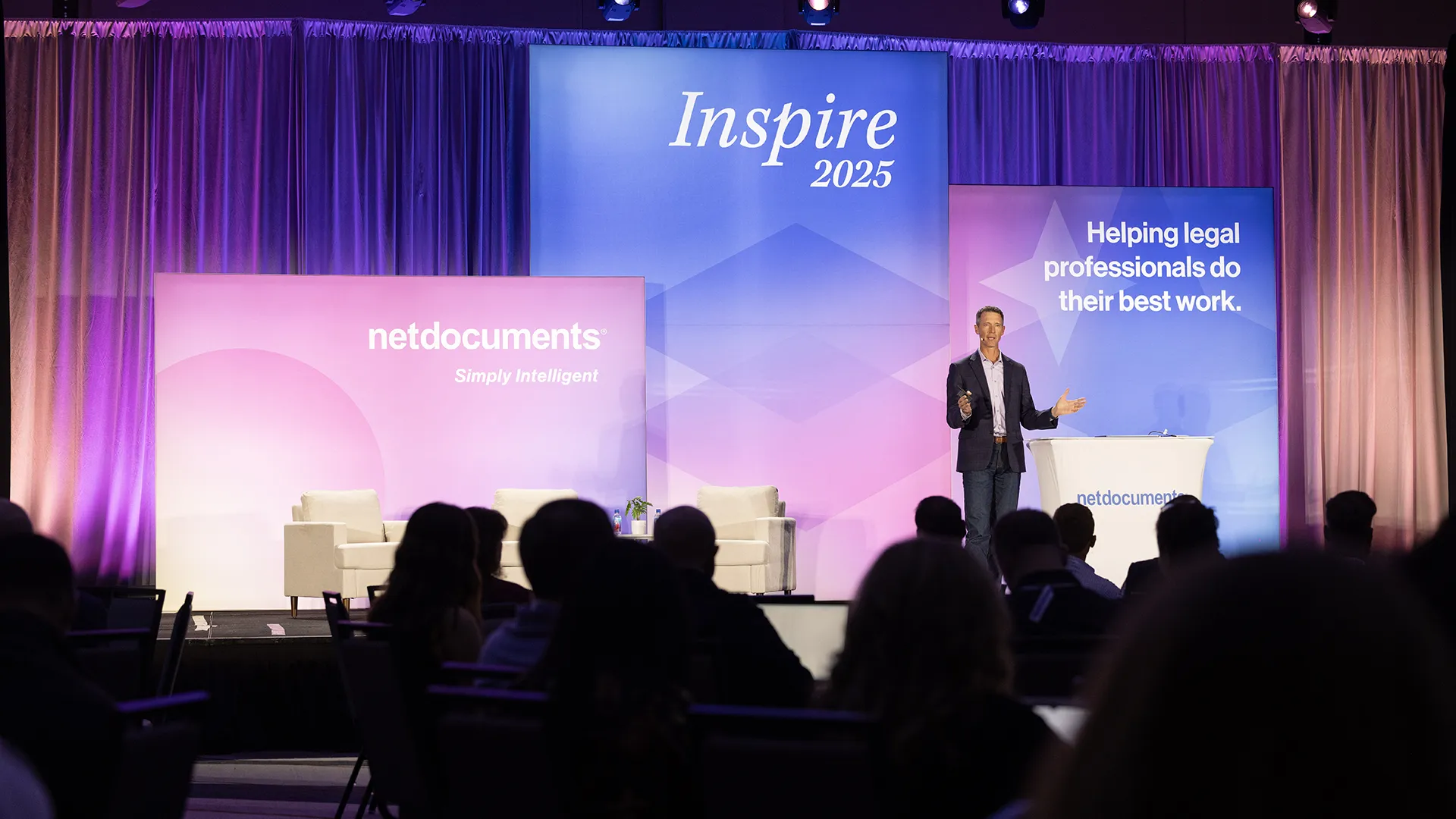
BLOG
What Is Agentic AI? And Why Should It Matter to Legal Professionals?


Michelle Spencer
Legal Technology Strategist
Agentic AI has quickly become one of the most talked-about concepts in legal technology for 2025. The idea of artificial intelligence taking autonomous action can feel either exciting or intimidating — or sometimes both.
The expectations for agentic AI are sky-high, especially with generative AI pushing the boundaries, but it also raises the question: what can we realistically expect?
Before jumping to conclusions or scary sci-fi scenarios of autonomous robots acting entirely on their own, it’s important to understand what agentic AI really is, how it differs from other types of AI, and why it represents a major leap forward for the legal profession.
TL;DR
- Agentic AI performs real legal tasks autonomously, not just through chat responses.
- Embedded in your DMS, it securely automates context-aware workflows and document actions.
- It transforms your DMS into a digital co-worker that boosts efficiency and strategic focus.
Understanding the Spectrum of AI Tools
To grasp the importance of agentic AI, let’s begin with what legal professionals are already familiar with: chatbots, AI assistants, and AI apps.
- Chatbots like ChatGPT or Microsoft Copilot work through simple input/output interactions. You ask a question, and the chatbot gives an answer based on a large language model (LLM). These tools are helpful but limited, as they can’t access your documents or complete tasks on your behalf.
- AI Assistants go a step further. They act as AI orchestrators, capable of retrieving additional information and performing more complex interactions with the LLM. For example, a legal AI assistant might pull content from your firm’s document management system (DMS) to generate a summary, answer client-specific questions, or create timelines.
- AI-Powered Legal Apps are purpose-built applications that leverage AI to complete specific legal tasks — like clause extraction, contract comparison, or automatic document generation. Often integrated into your legal tech stack, they can extend your capabilities greatly. They can be simple or very robust and are often the best way to automate repeatable, scalable, document-centric work.
- Agentic AI is not a new concept but has recently become a buzzword, promising almost magical “reasoning” or “understanding” of complex legal tasks. The truth is far less mysterious: An AI agent is basically a piece of software (i.e., an assistant or application) with access to purpose-built, AI-powered tools that enables the agent to operate autonomously to complete tasks or facilitate workflows.
The distinction between an app and an agent can sometimes be a fine one. For example, let’s say you have an app that lawyers use to automatically extract deal terms from agreements, store them in a database, and apply those terms as metadata to the documents. If that app runs autonomously when, for example, a new agreement is added to a matter folder, it is effectively acting as an agent.
But there’s still a crucial distinction: What makes AI truly “agentic”?
What Agentic AI for Legal Is & What It Isn’t
Agentic AI isn’t just smarter chat. It’s about autonomous action.
To be truly agentic, an AI must not only understand context and language — it must be able to take meaningful actions on the user’s behalf. This means accessing tools, executing workflows, and collaborating with other systems. It’s not just giving answers. It’s getting things done.
Agentic AI builds on the strengths of LLMs (natural language processing) and enhances them with skills, tools, and workflow automation systems. For example:
- Editing or marking up legal documents via natural language commands.
- Extracting information automatically from contracts.
- Generating summaries, timelines, or entire documents.
- Interfacing with apps built specifically for legal work.
This capability turns an assistant into a fully agentic system that can leverage your documents, your tools, and your workflows to complete tasks with minimal human intervention, yet under human control.
Why Agentic AI Matters for Lawyers
Legal work is filled with multi-step, high-stakes workflows. A single contract revision might require locating documents, identifying key sections, rewriting language, and ensuring consistency across versions. That’s a lot of context-switching and attention to detail — often under time pressure.
Think about how many times a day edits are made to legal documents in your firm or legal department. Some of the edits are simple like changing the closing date or purchase price. Others are more complex like replacing PII/PHI with placeholders, adding arbitration and severability clauses, or limiting disclosures in an NDA to employees only.
Next, consider how much time and cognitive load is spent finding documents, locating all the places edits need to be made, composing the language of the edits, and then making those changes.
What if your AI assistant could do some of that for you?
Not just suggest edits, but actually open each document, apply changes, and prompt you to review them — all while maintaining compliance and context awareness.
That’s the power of agentic AI in action: reducing cognitive load, eliminating repetitive steps, and enabling you to focus on legal strategy and client impact.
Why the Best Agentic AI for Legal Belongs in Your DMS
For legal professionals, where you place your AI matters. A standalone chatbot won’t understand your cases, your precedent, your clients, or your security requirements. But an AI agent built into the platforms you already use — like your DMS — will.
Here’s why the most powerful and trustworthy agentic AI will be embedded in foundational tools like your DMS:
- Context is everything: Your documents contain your knowledge and expertise. An agentic AI assistant within your DMS can use that information in real time, making it more accurate, relevant, and valuable.
- Security and compliance are non-negotiable: Legal data must be handled with the highest security standards. Embedding agentic AI in your trusted DMS infrastructure ensures compliance and governance are built in.
- Workflow automation and productivity: From editing contracts to extracting key terms or generating case timelines, agentic AI within your DMS transforms passive information into active workflows — boosting efficiency across your practice.
- Scalability through integration: The future of agentic AI in legal includes not just built-in tools (like editing, extraction, and timeline generation), but also the ability for firms to create their own tools using platforms like the ndMAX AI App Builder. These custom tools can then be orchestrated by the AI, expanding its autonomy and usefulness even further.
Webinar
See How Legal Teams Use an Intelligent DMS to Turn Insight into Autonomous Action
Agentic AI: A Trusted Digital Co-Worker
Agentic AI isn’t about replacing lawyers — it’s about empowering them. It handles the repetitive, data-heavy, and procedural tasks so legal professionals can focus on strategy, judgment, and client relationships.
Alongside advanced assistants, no-code application platforms, and AI-powered search capabilities, agentic AI is a big part of what delineates traditional document management systems from the truly intelligent DMS that goes beyond being a place to securely store and organize documents to serving as a trusted digital co-worker that helps lawyers deliver impeccable work product in less time and with less effort. As more tools become available and integrate seamlessly with agentic assistants, legal professionals will move from simply asking for help to delegating complex tasks with confidence. That shift — from answering to doing — will define the next era of legal technology.
Want to see NetDocuments AI in action? Click here to get a demo today.
Explore these other blogs
-

- Blog
True AI Search vs. AI-Assisted Querying
Jared Beckstead Senior Product Marketing Manager NetDocuments Pick any month in…
-

- Blog
Inspire 2025 Phoenix Day 3 Recap: NetDocuments AI Search Makes Its Debut
Michael Owen Hill Director of Product Marketing Another successful NetDocuments Inspire…
-

- Blog
Day 2 Recap from Inspire Phoenix: Innovation Where Great Legal Work Happens
Michael Owen Hill Director of Product Marketing Day two of Inspire…
-

- Blog
The Intelligent DMS: Solving Yesterday’s Frustrations and Creating New Solutions for Tomorrow
Michelle Spencer Lead Technology Strategist Legal professionals have always demanded more…
netdocuments


